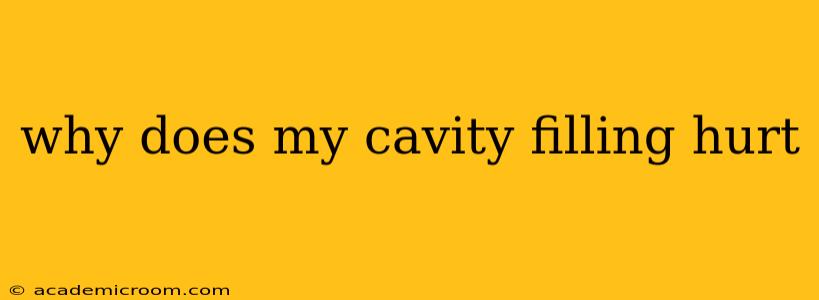A tooth filling, while designed to repair a cavity and protect your tooth, can sometimes cause pain. This pain can manifest in various ways and have several underlying causes. Understanding these potential reasons is crucial for effective management and prevention of future discomfort.
What Causes Post-Filling Toothache?
Several factors can contribute to pain after a cavity filling. Let's explore the most common culprits:
1. Irritation of the Tooth's Nerve:
Even with the most skillful dental work, the process of drilling and filling a cavity can cause temporary irritation to the tooth's nerve (pulp). This irritation usually subsides within a few days as the tooth heals. However, persistent or severe pain warrants a visit to your dentist. The dentist might use additional procedures to address this problem and alleviate the pain.
2. High Filling:
If the filling is placed too high, it can cause your teeth to come into contact prematurely when you bite down. This can lead to discomfort, pain, and even jaw problems over time. Your dentist can easily adjust the filling height to resolve this issue.
3. Infection or Inflammation:
In some cases, a lingering infection or inflammation in the tooth or surrounding gum tissue could cause pain even after the filling is in place. This pain might be persistent, throbbing, or accompanied by swelling or sensitivity to temperature changes. Your dentist will need to assess the situation and may prescribe antibiotics or other treatments.
4. Sensitivity to Temperature:
Sensitivity to hot or cold is a common experience following a filling, particularly in the initial days. This is typically temporary and caused by the filling material’s proximity to the tooth’s dentin, a layer sensitive to temperature changes. However, prolonged or severe sensitivity requires attention from your dentist.
5. Fracture or Crack in the Tooth:
In rare cases, an existing crack or fracture in the tooth might be aggravated by the filling procedure, leading to pain. This type of pain usually presents as sharp, shooting sensations. Your dentist will need to perform further examinations to diagnose and treat the fracture effectively.
6. Improper Filling Technique:
While rare with experienced dentists, improper techniques in preparing the cavity or placing the filling could lead to post-filling pain. This could involve improper cleaning of the cavity or leaving behind decayed tooth structure which promotes an ongoing infection. Seek immediate consultation with your dentist if you suspect this may be the case.
7. Bite Adjustment Issues:
A change in your bite after a filling can lead to temporomandibular joint (TMJ) pain, causing discomfort in the jaw and surrounding area. Your dentist can help to adjust your bite through an occlusal adjustment, balancing the pressure between your upper and lower teeth.
When to See Your Dentist
While some mild, temporary discomfort after a filling is normal, persistent, severe, or unusual pain necessitates a visit to your dentist. Don't hesitate to schedule an appointment if your pain:
- Persists for more than a few days.
- Is severe or throbbing.
- Is accompanied by swelling or fever.
- Is sensitive to hot or cold food and drinks beyond the initial few days.
- Radiates to other parts of your face or jaw.
Your dentist can diagnose the cause of your pain and provide appropriate treatment. Early intervention is key to preventing potential complications.
How Can I Prevent Post-Filling Pain?
Good oral hygiene practices are essential to minimize the risk of post-filling pain. These include:
- Meticulous brushing and flossing: Keeping the area around the filling clean helps prevent infection and irritation.
- Regular dental checkups: Regular visits help detect any issues early.
- Following your dentist's instructions: Carefully heed all post-operative instructions to ensure proper healing.
Remember, prompt attention to any post-filling pain is crucial for maintaining good oral health. Don't suffer in silence – consult your dentist for the best course of action.
